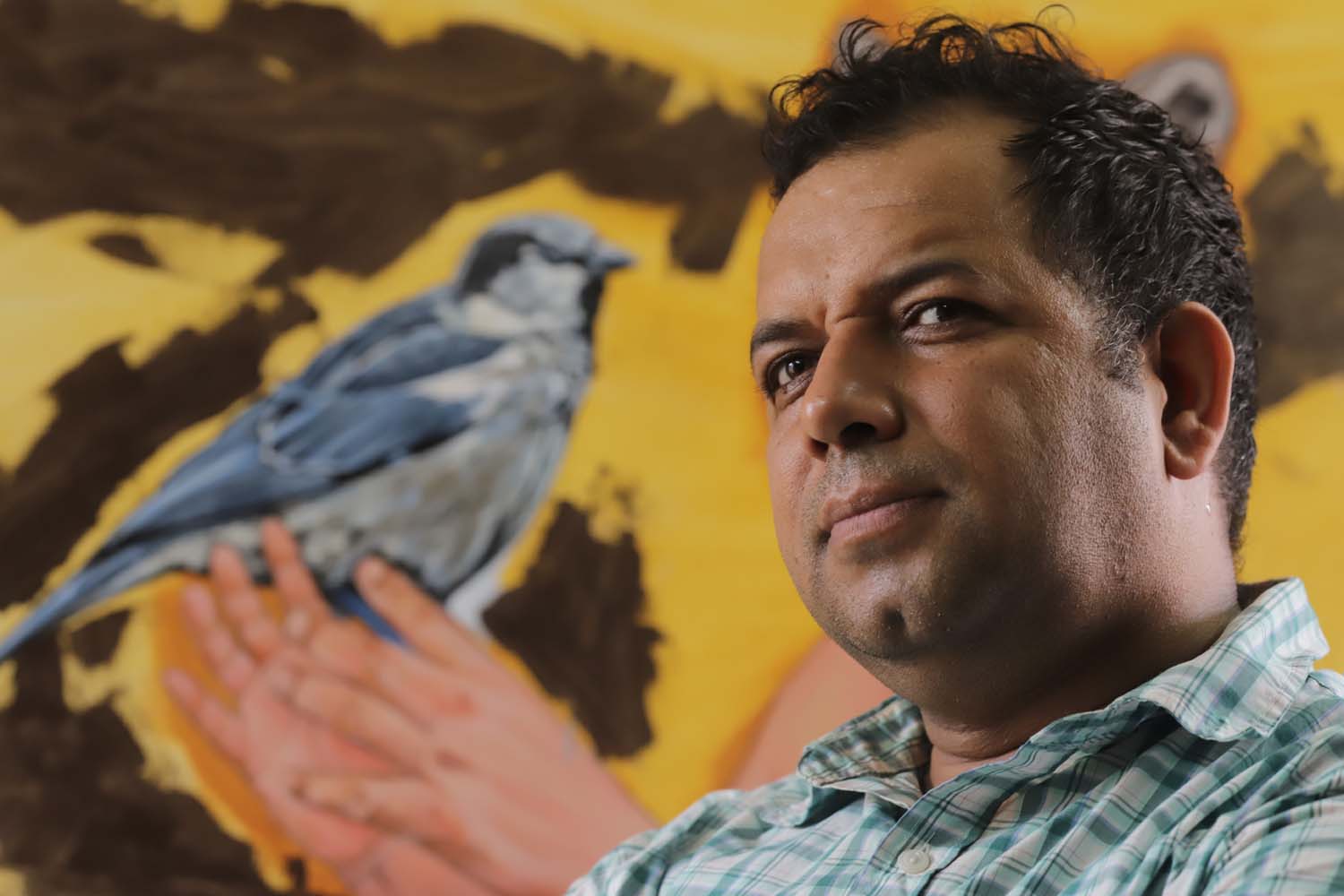Manoj Pandit is a film writer, producer and director known for his works ‘Chhayan’, ‘Dasdhunga’ and ‘Badhshala’. He is also the author of ‘Cinemamanthan’. Pandit’s career is closely linked to his love for reading.
Literature, he explains, provides the facts and imagination needed to understand human nature, emotions and relationships – elements that are crucial to his style of storytelling.
In this conversation with the post‘S Sanskriti PokharelPandit explains how he incorporates elements from literature into his films and how books have helped him grow.
As a filmmaker, what genres of books do you usually read?
Non-fiction plays an essential role in my film work. I am drawn to books about historical events. They expand my knowledge and help me develop new ideas that I can incorporate into the films I work on.
I also read books that try to blur the line between fiction and non-fiction. I tried such an approach in my film Dasdhunga, which I called docufiction.
How do you integrate themes from literature into the narratives of your films?
Literature has provided me with crucial conflicts that I have incorporated into my films. Both fictional and non-fictional works offer individual and collective challenges, societal dilemmas and struggles to resolve them. These literary themes shape the discourse in my films and provide the fundamental ideas that drive the narratives I create.
Beyond themes, literature also fuels my imagination. It allows me to create worlds for my characters to live in and gives depth to the stories I write.
What role do books play in helping filmmakers develop a deeper understanding of human emotions and relationships, as explored in “Chhayan”?
Books, news reports and magazines about victims of child sexual abuse became my source for films like Chhayan.
Books are a valuable resource for filmmakers who want to explore the complex dimensions of human emotions and relationships that are central to many narratives, including this film.
Literature is, in a sense, a bank of subjective and objective data. It summarizes human experiences and emotions and offers insights into human needs, desires and dilemmas. It also leads us to deal with the coexistence of contradictions, which helps filmmakers understand the nature of life in different times and places.
Such understanding is crucial for filmmakers as it enables us to create characters and stories that resonate emotionally with audiences, similar to ‘Chhayan’.
How do you think reading has shaped your views on social and political issues, as seen in your films like Greater Nepal In Quest Of Boundary and Dasdhunga?
Reading has profoundly shaped my understanding of social and political issues, which is evident in my films like Greater Nepal In Quest Of Boundary and Dasdhunga. Teestadekhi Satalaj (Kagada) Samma and Nepalko Simana were the books that inspired me to make Greater Nepal In Quest Of Boundary.
Moreover, the investigative news reports and historical documents on the Dasdhunga incident, in which politician Madan Bhandari lost his life, ignited in me a burning passion to make a film on the subject.
Literature has allowed me to see different perspectives – those of the victims, the perpetrators and the resilient. Reading has given me a deeper understanding of the nature of power, politics, the human psyche and the history of civilization. This awareness has shaped my approach to storytelling and enabled me to more authentically portray the complexity of social and political issues.
What advice would you give to aspiring filmmakers regarding the importance of reading and how it can enhance their creative process?
Great cinema begins with philosophy, not story. For aspiring filmmakers, the journey to creating impactful cinema begins with a deep engagement with philosophy, rather than focusing solely on narrative.
Understanding your philosophical beliefs is critical to shaping the themes, premises, and stories you tell. Delving into philosophy clarifies your thoughts and beliefs and influences the characters you create and the conflicts that arise in your films.
A common challenge faced by filmmakers is not recognizing the integral role philosophy plays in our lives and decision-making processes. As intellectual beings, our decisions are influenced by our philosophical outlook.
I encourage them to read books like Saying Yes to Life Anyway, Tao Te Ching, The Art of War and The Second Sex.
Manoj Pandit’s five book recommendations
Sophie’s World
Author: Jostein Gaarder
Publisher: Farrar, Straus and Giroux
Year: 1995
This book is a mix of mystery and fantasy. Gaarder’s writing style blurs the line between fiction and nonfiction, and his philosophical discussions had a big influence on me.
The hero with a thousand faces
Author: Joseph Campbell
Publisher: New World Library
Year: 2008
Many of the best films follow the monomythic structure described in this book, which describes a character’s journey. I highly recommend all filmmakers read it.
Animal Farm
Author: George Orwell
Publisher: Secker and Warburg
Year: 1945
This classic political satire, set on a farm with anthropomorphic animals, introduced me to the nature of politics. It’s fair to say that Orwell’s book broadened my understanding of human nature.
Thus spoke zarathustra
Author: Friedrich Nietzsche
Publisher: Oxford University Press
Year: 1883
It contains the German philosopher’s famous discussion of the sentence “God is dead”. Although he is called a nihilist, I consider him to be the most critical philosopher in Western philosophy.
The Buddha and his teachings
Author: Narada Maha Thera
Publisher: Jaico Publishing House
Year: 2006
The author discusses concepts that form the basis of Buddhism and offers detailed introductions to its teachings. The knowledge imparted by this book seems immeasurable.

